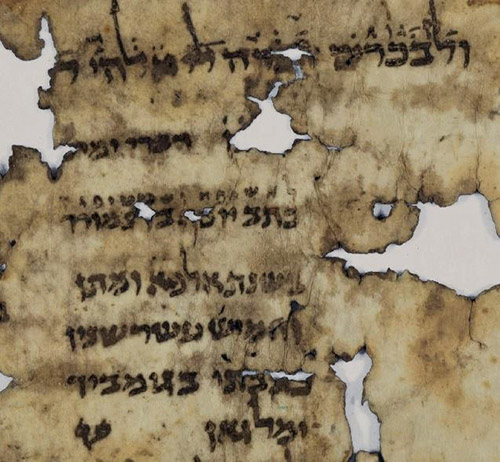

There are some really great resources for Jewish history on Facebook (aside from Channeling Jewish History, of course). One of them is a page titled:
גניזת קהיר – היסטוריה של היום-יום or Cairo Genizah Micro History. The page brings snippets of documents that were discovered among the vast corpus of the Cairo Genizah, revealing a fascinating world that lay hidden for more than a millenium. One of the documents recently featured (it is in fact the oldest dated Genizah document) is a ketubah from Egypt written in the year 870. The document (which was discarded due to a written error in dating) contains the name יוסף בר נמורד transliterated as Joseph son of Nemorad, or perhaps it in fact should be read as “the son of Nimrod,” demonstrating that the name Nimrod was already kosher among Jews in the Mediterranean more than a 1,000 years ago.
כתב יוסף בר נמורד
Halper 331 (Philadelphia, United States, University of Pennsylvania, Center for Advanced Judaic Studies Library, Cairo Genizah Collection)
Was the Historical Nimrod Actually a Good Guy?
By the way, it is important to note that contrary to the prevailing Jewish view that the Biblical Nimrod was evil, the famed exegete Rabbi Abraham Ibn Ezra had a dissenting view, writing,
“Do not pay too much attention to a name [the Hebrew root of the word Nimrod is mered – rebellion] if its meaning is not expressly pointed out in the biblical text. Nimrod was the first to show mankind’s might over the animals for he was a “mighty hunter.” The phrase “before Hashem” tells us that Nimrod would build altars to God and sacrifice the animals that he caught to God (!). This is the straightforward reading of the text (derekh ha-peshat); however, the midrash chooses a different reading”.
Nachmanides/Ramban, for good measure, takes the Ibn Ezra to task for this radical interpretation and writes, «How can he be correct!? He has transformed the rasha into a tzaddik! Our sages know from the earliest tradition that Nimrod was evil.» Ramban then launches into his own explanation as to what Nimrod represented.
Does Nimrod Mean Immortal in Persian?
There is a word in Persian that sounds very similar to Nimrod نمرده it means ‘immortal’ or ‘the one that came back to life’. A murkyPersian-Jewish tradition whose provenance I have not been able to establish with certainty, claims that this name was given to someone who was at death’s door but then miraculously came back to life.
By the way, if you think Nimrod is a rebellious name, let me introduce you to Moav Vardi, a journalist for the Israeli Kan 11 Broadcasting company and the son of a Kibbutznik family. Then again, Moav is the progenitor of Ruth and therefore a grandfather of the Davidic Dynasty. In fact, in the Book of Ezra (2, 6) we found a family of returnees to Zion called Bnei Pachat Moav which translates literally to ‘the sons of the rulers of Moab’. At least one opinion apparently holds that the patriarch of this notable Jewish family was actually named Pachat Moav. The Talmud in Tractate Taanit carries a disagreement on whether they were they descendants of King David (who was himself the descendant of Ruth the Moabite) or they were referred to as such because they descended from David’s general, Yoav ben Seruya who vanquished the Moabites (Yoav was David’s nephew by blood rendering him likewise a descendant of Moav).
A Jew in 11th Century Damascus named Yitro.
Speaking of the Cairo Genizah and unusual names, here’s another one: Avraham son of Yitro, a children’s teacher from Syria wrote a letter where he requests alms from wealthy potential patrons (apparently teachers have always been underpaid. I used to be a teacher, the struggle is real).
Notice the signature of Avraham son of Yitro
אברהם מדמשק מלמד בן יתרו תנצבה סימן טוב (ס״ט?!)ט
By the way, in the book Zecher David (a book on circumcision) by Rabbi David Zakut of Modena, Italy, the author writes that one should not name a child after converts, therefore, one should not name their son, for instanc, Onkelos or Yitro (whether this ruling applies to actual converts as well is unclear). Although we do find scant or no usage of exclusively convert names, e.g. Yitro, Avtalyon et al, this is one opinion and obviously there are others. By the way,Yitro wasn’t exactly a ger either in the conventional meaning of the term. Interestingly, Rabbi Chaim Kanievsky who tends to be highly conservative when it comes to naming conventions does not share this concern about using convert names. I’ll have much more about peculiar Jewish names in the coming weeks and months g-d willing.
The writer is an independent scholar of Jewish history and runs the group Channeling Jewish History. He is also a freelance translator from Hebrew to English. He can be reached at yoelswe@gmail.com










